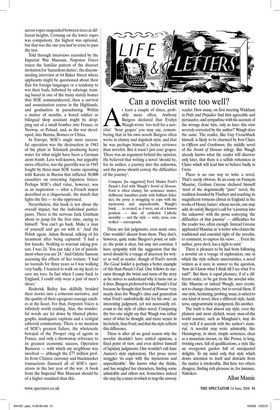Inspirational individuals
Andro Linklater
FORGOTTEN VOICES OF THE SECRET WAR: AN INSIDE HISTORY OF SPECIAL OPERATIONS DURING THE SECOND WORLD WAR by Roderick Bailey, in association with the Imperial War Museum Ebury Press, £19.99, pp. 382, ISBN 9780091918507 ✆ £15.19 (plus £2.45 p&p) 0870 429 6655 My 85-year-old neighbour bows to passing magpies, casts spells, and gleefully claims to be ‘a mad old bat’. Eccentric you might say. But she also speaks Mandarin Chinese and sports on her desk a photograph of herself in 1945 carrying a rifle on a hillside above Kunming in southern China where she helped SOE run one of the most successful blackmarket operations of the second world war. So it would be truer to say that she has never cared much for being one of the crowd. Egregious is really the word.
Reading this oral history of the Special Operations Executive, it is clear that being egregious was the one quality that everyone who served in SOE had to possess. Almost all other forms of warfare involved merging individuality into the unit. ‘There was the regimentalness, you know’, one agent remarked of his career as a soldier. ‘I thought it was terrible actually. It’s not my kind of life.’ Brought into being in July 1940 by Churchill’s injunction to ‘set Europe ablaze’, SOE provided a means of fighting singly, as a saboteur, a resistant, a terrorist. It’s why these stories, though they have been told in scores of other books, remain utterly compelling. This is what it is like to be solitary, expelled from society’s comforts and conventions to live in a hostile world.
Whatever other qualities SOE looked for — ‘We were to be gangsters’ one male recruit suggested, ‘but with the behaviour, if possible, of gentlemen’ — the basic requirement was the ability to react individually. A classic SOE test for recruits was to crawl across ropes suspended between trees at different heights. Crossing on the lower ropes was compulsory, the highest was optional, but that was the one you had to cross to pass the test.
Told through interviews recorded by the Imperial War Museum, Forgotten Voices traces the familiar pattern of the discreet invitation for ‘hazardous duties’, the discommoding interview at 64 Baker Street where applicants might be questioned about their flair for foreign languages or a tendency to wet their beds, followed by sabotage training based in one of the many stately homes that SOE commandeered, then a survival and assassination course in the Highlands, and graduation in parachuting. Within a matter of months, a bored soldier or bilingual shop assistant might be dropping out of a small bomber into France, or Norway, or Poland, and, as the war developed, into Burma, Borneo or China.
In Europe, SOE’s single most successful operation was the destruction in 1943 of the plant in Telemark producing heavy water for what might have been a German atom bomb. Less well-known, but arguably more effective, was the guerrilla war in 1945 fought by three-man SOE teams operating with Karens in Burma that inflicted 30,000 casualties on retreating Japanese forces. Perhaps SOE’s chief value, however, was as an inspiration — what a French mayor described as a chiquenaude, the match that lights the fire — to the oppressed.
Nevertheless, this book is not about the overall impact, but the individual participants. There is the nervous Jack Grinham about to jump for the first time, saying to himself: ‘You can’t go back. Make a man of yourself and get on with it.’ And the Polish agent, Adam Benrad, talking of his treatment after being captured: ‘I had a few knocks. Nothing to warrant taking poison. I was 24. You can take a lot of punishment when you are 24.’ And Odette Sansom assessing the effects of her torture: ‘I had no toenails for three years so I was walking very badly. I learned to walk on my heels to save my toes. In fact when I came back to England, I could only wear a pair of men’s shoes.’ Roderick Bailey has skilfully braided their stories into a coherent narrative, and the quality of their egregious courage catches at the heart. For that, Forgotten Voices is infinitely worth reading. Alas, the wonderful words are let down by blurred photographs, inadequate captions and a vestigial editorial commentary. There is no mention of SOE’s greatest failure, the wholescale betrayal of the Prosper ring of agents in France, and only a throwaway reference to its greatest economic success, Operation Remorse — with which my neighbour was involved — although the £77 million profits from Chinese currency and blackmarket transactions financed all of SOE’s operations in the last year of the war. A book from the Imperial War Museum should be of a higher standard than this.



















































































 Previous page
Previous page